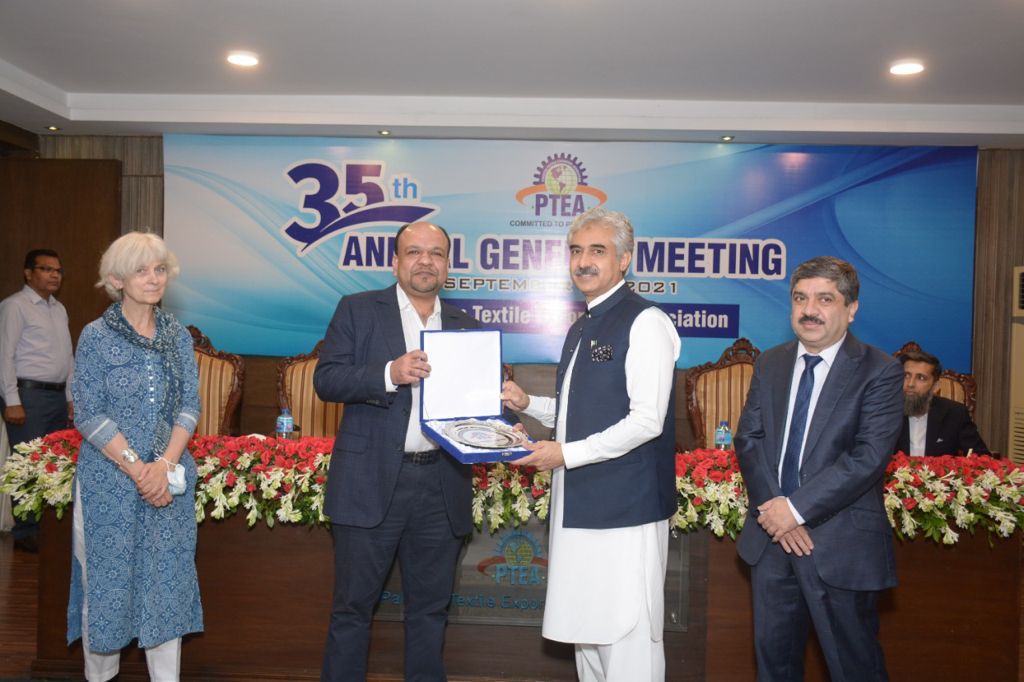FAISALABAD– Provincial Minister for Commerce & Industries Mian Aslam Iqbal has said the government is transforming Punjab into a hub of investment, trade and economic activities.
Within a short span of three years, the government has set up 23 small industrial estates in the province; whereas13 special economic zones are also being established in Punjab.
Addressing the 35th Annual General Meeting of Pakistan Textile Exporters Association, he said that due to the investor friendly environment, local and foreign investors are investing in Punjab. The growing investment in the country is an expression of confidence in Prime Minister Imran Khan’s economic policies.
New industrial zones in the province would usher a new era of industrial development in Punjab, he said and added that the Punjab Board of Investment would not spare any effort in promoting investment in the province and providing facilities to investors.
Under the vision of Prime Minister Imran Khan, Punjab Government is committed to facilitate industrialists and investors for improving economic activities and increasing employment opportunities, he said.
Faisalabad is the central hub of textile sector, with a large share in exports of different textile products; therefore, country’s biggest expo center will be established at Faisalabad. Government have strong believes that economic revolution in the country can only be possible through trade promotion and all possible support to export sector is being extended to achieve optimum growth.
Textile industry is the backbone of economy and remedial measures to overcome the challenges are being taken to uplift this sector. In order to keep industrial wheels moving during pandemic times, Government had taken several measures including easy financing for payment of wages and liquidation of outstanding refunds.
No country could achieve economic targets without the due role of exporters, he said. Future of Pakistan is very bright and all resources will be mobilized for converting Pakistan according to the Premier’s vision of economically stable and strong Pakistan.
The Country Director ILO Ms. Ingrid Christensen, addressing the occasion, said that Better Work Programme (BWP) will help improve Pakistan’s compliance and exhibit its commitment to improve labour welfare.
BWP included a comprehensive framework on improving industrial relations through training and compliance with international labour standards including occupational safety and health, nature of employment, discrimination and other forms of labour practices as well as strengthening employers’ and workers’ organisation in textile industry, she said.
This program is successfully being run by ILO and IFC in eight countries benefiting a workforce of 2.5 million as 1,700 factories and 150 international brands are linked with this programme, she added.
Earlier, PTEA Chairman Muhammad Ahmad presenting his annual report said that despite the turbulent economic environment and challenges appeared on account of Covid-19, Association continued its efforts to put the business on the path of economic diversification and growth by enhancing its value proposition. This year, we envisioned the idea of striving towards pro-business reforms to ensure a favorable environment that is conducive to growth, boost productivity and enhance the competitiveness with regional rivals in international markets.
To achieve the same, we worked closely with the Government quarters and all relevant flora to build mutual grounds for the betterment of textile industry in general and textile exporters in particular.
Some of such initiatives were the formulation of ease of doing business proposals, reduction in cost of production, structural reforms in the tax system and availability of energy inputs at regionally competitive prices.
He expressed the hope that new team will continue the efforts to strengthen the linkages with the local and international businesses to promote and protect the interests of textile industry.
Newly elected Chairman PTEA Sohail Pasha, addressing the participants said that rising cost of doing business has not only stalled fresh investment in the textile industry but have also hampered the export growth. Government should devise a comprehensive strategy to counter the issue in order to accelerate the industrial pace and also to save livelihood of millions of workers.
Pakistani exports are under pressure due to prevailing economic financial, industrial crisis in the country as well as persistently high cost of production which is badly affecting the industrial and trade activities and productivity output. He appreciated the successful efforts of outgoing team in resolving the issues confronting exports.
Later, shields were presented to Provincial Minister for Commerce & Trade Mian Aslam Iqbal, country Director ILO and outgoing chairman, Vice Chairman. A large number of textile exporters were present at the occasion.— PRESS RELEASE

